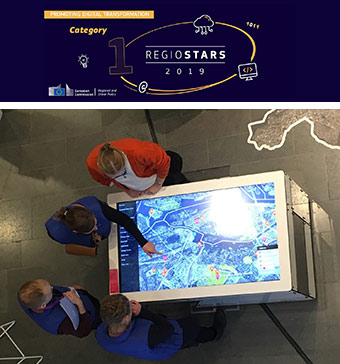Sweden’s greater Stockholm region is making municipal data publicly available to local SMEs to help foster innovation and growth. The Open Data in the Stockholm Region project is developing common processes and tools and establishing technical parameters which allow 26 municipalities to share their data freely and efficiently with enterprises and other organisations. The project aims to ensure its results can be scaled up nationally to benefit all of Sweden’s 290 municipalities and the country’s business community.
Harnessing the power of open data in the Stockholm region
- 27 September 2019
One of the cornerstones of this project is the flipped perspective: we started with the needs and requests from small and medium sized companies, instead of just releasing the data that was easiest to open up. This is what makes the Open data in Stockholm project different, and is also the drive behind the idea of enabling innovation and new ideas in the private sector with the use of public service Open Data.
To increase the use of open data, the project is working with both municipalities and SMEs. Municipalities have taken part in workshops and meetings. The project is running several pilot actions which focus on publishing single datasets with common standards for all municipalities.
Assessing needs
The project has assessed the needs of SMEs while encouraging them to influence the kind of open data they would like to see published. SMEs are keen to see data published in a number of areas that could help them grow and innovate. Examples include environmental data such as air quality, along with real time sensor data from traffic, information about available parking spots and where to find electric car charging stations. Other areas could include statistics about schools, details about where snowploughs are operating and information about upcoming events.
Open Data Stockholm has already generated solid results. Common open data principles, processes, tools and action plans have been developed and shared with the 26 municipalities. The project has obtained a shared open data portal for all the municipalities to use, with guidance from the core project team. In addition, 450 local companies have been identified as potential open data beneficiaries, of which 50 are actively engaged in the project process.
Learning process
More than 100 stakeholders have been educated on open data through the project. The project team has carried out awareness-raising activities through blog posts, social media, and by participating in conferences, events, forums and more. It has established cooperation with organisations like national authorities and other open data initiatives.
According to the project team, the municipalities have become more efficient in working with data in general and open data in particular. In the project’s final phase, data from the pilot actions will be published to the benefit of the collaborating SMEs. The open data portal may be shared with Stockholm City Council to exploit data in the areas of public healthcare and transport.
Beneficiaries
“As someone once said – data should be as open as possible and as closed as necessary. Microsoft is happy to see that Open Data in the Stockholm Region is working closely with all stakeholders in a data economy to achieve real results.”
– Daniel Akenine, national technology officer Microsoft
“Open data is essential to understanding our societies and drive innovation to solve humanity’s contemporary and future challenges. At Datastory we use this open data to democratise knowledge, using novel data science and storytelling techniques.”
– Daniel Lapidus, founder and director of Datastory
Total investment and EU funding
Total investment for the project “Open Data in the Stockholm Region” is EUR 1 400 000, with the EU’s European Regional Development Fund contributing EUR 1 400 000 through the “Stockholm” Operational Programme for the 2014-2020 programming period. The investment falls under the priority “Research and innovation”.

